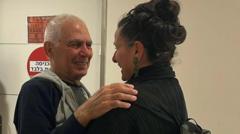The series of conversations marks a significant return to international collaboration, setting a strategic tone for Trump's upcoming presidency.
Global Leaders Congratulate Trump, Strengthening Alliances Ahead of Second Term

Global Leaders Congratulate Trump, Strengthening Alliances Ahead of Second Term
In a whirlwind of diplomatic calls, President-elect Trump reconnects with world leaders, prioritizing security and trade.
Following his election victory, President-elect Donald Trump engaged in a significant round of discussions with global leaders on Wednesday, receiving congratulations and renewing vital international partnerships. The talks centered around shared security interests, economic cooperation, and strategic alliances, establishing a framework for Trump’s second term in office.
Israeli Prime Minister Benjamin Netanyahu was among the first to connect with Trump, where they reportedly shared a “warm and cordial” discussion focused on Israel’s security issues. The conversation also addressed mutual concerns regarding Iran, notably in light of U.S. intelligence reports of an alleged Iranian plot targeting Trump. This dialog marked a notable turn from their previously strained relations as both leaders committed to enhancing security cooperation in the region.
Canadian Prime Minister Justin Trudeau also reached out to Trump, highlighting the “enduring and successful partnership” between the two nations. Their discussion revisited the U.S.-Mexico-Canada trade agreement, a cornerstone of Trump’s previous administration, as well as security matters affecting the North American continent. Furthermore, they underscored the significance of maintaining reliable supply chains and addressing unfair trade practices globally.
Indian Prime Minister Narendra Modi shared his enthusiasm for the dialogue with Trump, expressing a commitment to bolstering India-U.S. relations across various domains including technology, defense, and energy. Their conversation served to reinforce the long-standing strategic collaboration between their countries, amid an evolving international landscape.
South Korean President Yoon Suk Yeol addressed critical East Asian issues with Trump, particularly concerning North Korea’s involvement with Russian military efforts in Ukraine. Their discussion focused on security cooperation and economic strategies, emphasizing the necessity of a united front against regional threats posed by North Korea.
Saudi Crown Prince Mohammed bin Salman congratulated Trump and highlighted the long-standing "historical and strategic relations" between the two nations. The Crown Prince expressed hopes for continued collaboration in economic and security initiatives, signaling Saudi Arabia's commitment under Trump’s leadership.
French President Emmanuel Macron described his conversation with Trump as “very good,” addressing pressing matters such as the European Union, Ukraine, and joint action in the Middle East. Macron conveyed France’s readiness to team up with the U.S. in order to bolster international stability and tackle shared challenges.
These key dialogues indicate Trump’s renewed focus on foreign relations as he prepares for office, underlining the importance of global security and economic resilience. These interactions also present a clear signal of intent from world leaders to position themselves as integral allies in navigating intricate global challenges, spanning trade dynamics and security risks.
Israeli Prime Minister Benjamin Netanyahu was among the first to connect with Trump, where they reportedly shared a “warm and cordial” discussion focused on Israel’s security issues. The conversation also addressed mutual concerns regarding Iran, notably in light of U.S. intelligence reports of an alleged Iranian plot targeting Trump. This dialog marked a notable turn from their previously strained relations as both leaders committed to enhancing security cooperation in the region.
Canadian Prime Minister Justin Trudeau also reached out to Trump, highlighting the “enduring and successful partnership” between the two nations. Their discussion revisited the U.S.-Mexico-Canada trade agreement, a cornerstone of Trump’s previous administration, as well as security matters affecting the North American continent. Furthermore, they underscored the significance of maintaining reliable supply chains and addressing unfair trade practices globally.
Indian Prime Minister Narendra Modi shared his enthusiasm for the dialogue with Trump, expressing a commitment to bolstering India-U.S. relations across various domains including technology, defense, and energy. Their conversation served to reinforce the long-standing strategic collaboration between their countries, amid an evolving international landscape.
South Korean President Yoon Suk Yeol addressed critical East Asian issues with Trump, particularly concerning North Korea’s involvement with Russian military efforts in Ukraine. Their discussion focused on security cooperation and economic strategies, emphasizing the necessity of a united front against regional threats posed by North Korea.
Saudi Crown Prince Mohammed bin Salman congratulated Trump and highlighted the long-standing "historical and strategic relations" between the two nations. The Crown Prince expressed hopes for continued collaboration in economic and security initiatives, signaling Saudi Arabia's commitment under Trump’s leadership.
French President Emmanuel Macron described his conversation with Trump as “very good,” addressing pressing matters such as the European Union, Ukraine, and joint action in the Middle East. Macron conveyed France’s readiness to team up with the U.S. in order to bolster international stability and tackle shared challenges.
These key dialogues indicate Trump’s renewed focus on foreign relations as he prepares for office, underlining the importance of global security and economic resilience. These interactions also present a clear signal of intent from world leaders to position themselves as integral allies in navigating intricate global challenges, spanning trade dynamics and security risks.























